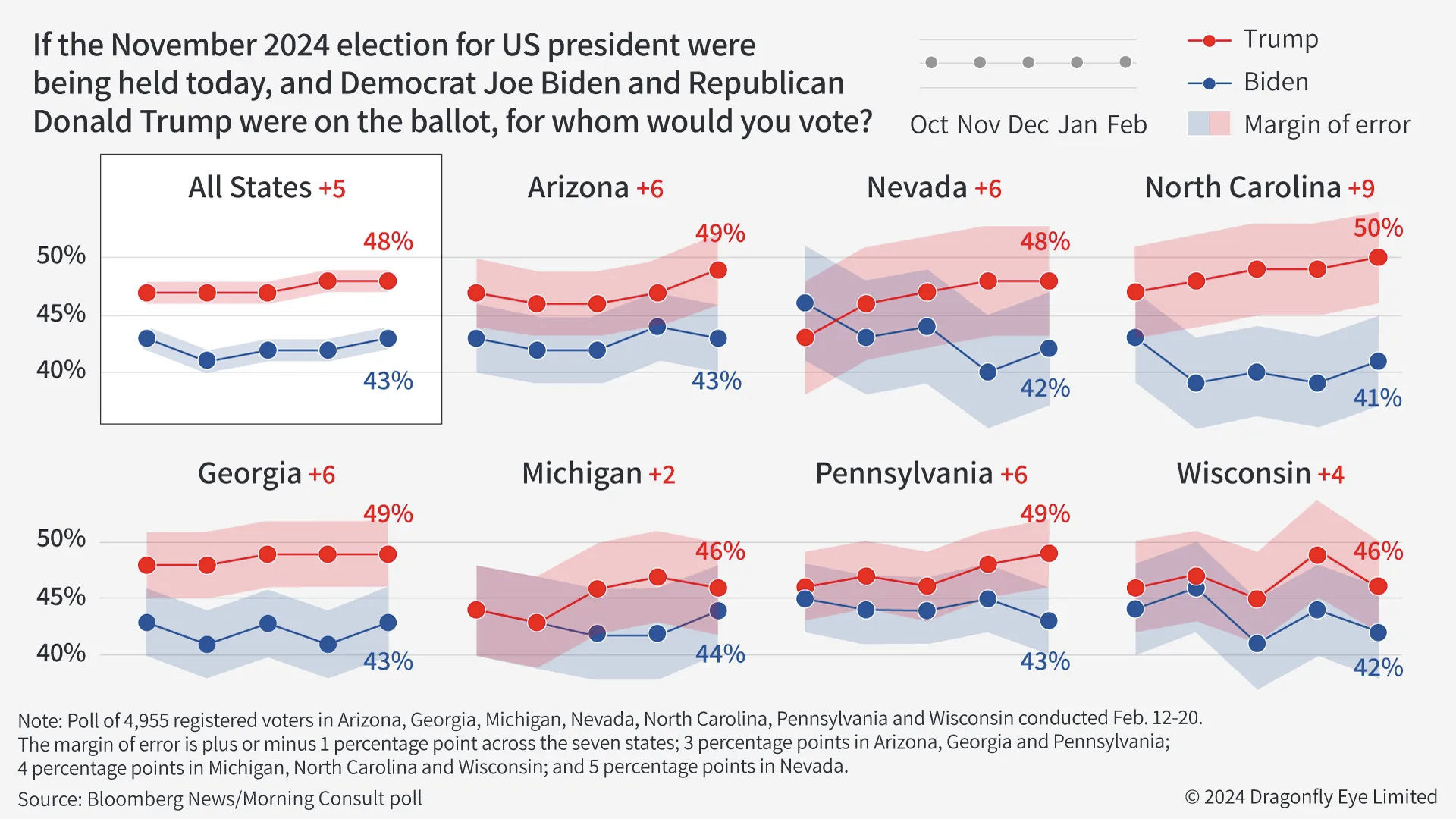Polling data, including from key electoral states, suggests that Trump is ahead of his Democratic opponent, President Joe Biden.
This assessment was issued to clients of Dragonfly’s Security Intelligence & Analysis Service (SIAS) on 14 March 2024.
We forecast that Donald Trump is likely to win the US presidential election on 5 November. State and national polling data indicate that he holds a slight lead over the incumbent Democratic candidate, President Joe Biden. This will probably remain the case over the coming months, in our analysis, given voters’ concerns about Biden’s candidacy.
Whatever the election result, we assess that major social or political upheaval is unlikely around the poll. Even if Trump loses, the country’s democratic institutions appear robust enough to prevent a crisis from occurring. Nevertheless, the coming months are likely to be characterised by extreme political and social polarisation, making isolated acts of political violence and some protests probable around the election.
Nomination path now clear
There is now almost no doubt that Trump will win the Republican nomination contest. He has defeated his rivals in nearly every Republican primary so far; Trump most recently won 14 of the 15 Republican primaries on ‘Super Tuesday’. The latest results indicate that Republican voters strongly prefer Trump as their candidate. In acknowledgment of this, Nikki Haley (the last remaining Republican challenger) suspended her campaign on 6 March. Republican delegates will almost certainly formally select Trump as their nominee during the Republican National Convention in July.
Major legal victory for Trump
Trump has also overcome the main legal obstacle to his seeking or holding the presidency. The US Supreme Court (SCOTUS) ruled on 4 March that he is eligible to stand on primary and general election ballots. The court specifically ruled that states do not have the authority to remove a federal candidate from the ballot under the 14th Amendment of the Constitution (the ‘insurrectionist ban’). State officials in Colorado and Maine, who had cited this amendment in removing Trump from ballots earlier this year, have since reinstated him.
Trump’s remaining legal issues will probably not hinder his presidential bid either. Even if Trump is convicted of any of the criminal charges he is facing before the general election, he would remain eligible to hold office. Legal experts cited in press reports suggest that most of these cases are unlikely to be resolved before November. And if they are, Trump’s legal team would almost certainly appeal any decisions against him. This means that the cases would probably remain unresolved beyond the election.
Trump leading Biden
The latest national polling data point to Trump winning in November. Countrywide, he is currently maintaining a very slight lead over President Biden in a head-to-head matchup. Based on a variety of surveys conducted in recent weeks, Trump’s lead over Biden ranged from two points to five percentage points among registered voters. And Biden seems to be struggling to convince voters that his administration has been effective; a Gallup poll published in late February shows that his approval rating is near 38%, which is one point off from Biden’s previous all-time low.

Trump also appears placed to gain more votes than Biden in several key states. These include Arizona, Georgia, Michigan, Nevada, North Carolina, Pennsylvania, and Wisconsin, where results have been decisive in determining the outcomes of recent presidential elections. Based on a Bloomberg News/Morning Consult poll of 4,955 voters in these states conducted from 12 to 20 February, Trump is currently leading Biden in all of them (see graphic).
Several obstacles facing the Biden campaign
We assess that Biden is likely to struggle to convince voters that he can effectively lead the country over the next four years. They seem concerned about his mental and physical capacity; a New York Times/Siena College poll conducted in February found that 73% of respondents said that he was too old to be effective.
Concerns around inflation, the economy, and immigration also seem to be driving a perception that the country is heading in the wrong direction. Exit polling from recent elections has shown that voters are mainly concerned about issues that impact their livelihood and families. And Biden is so far failing to break through to the electorate on these issues.
Limited potential for a crisis around the 2024 election
We assess that a political crisis around the upcoming presidential election is unlikely, on current indications. Democratic institutions in the US appear to be resilient and capable of swiftly resolving unprecedented challenges to them. This occurred during the 2020 presidential poll when the Trump campaign filed lawsuits in various states alleging widespread voter fraud; state judges dismissed the cases after finding they had no merit. Despite public pressure from Trump to prevent the certification of the election results, and an attack on the Capitol by a violent mob on 6 January 2021, Congress certified the election results on 7 January 2021.
It is unclear whether the country’s democratic institutions will face similar challenges this election cycle. On the campaign trail, Trump has not said that he would attempt to challenge or overturn the election results in the event that he loses. In our analysis, this is probably because most polls suggest that he is leading Biden. Were he to lose the election, we assess that there would be a good chance that Trump would again pursue legal challenges to undermine the validity of the results or overturn them, based on his previous efforts to do so in 2020 and his repeated allegations that the system is ‘rigged’ against him.
Another major incident of political violence around the upcoming election, such as the storming of the Capitol, is unlikely. This is because the subsequent arrest of more than 1,200 individuals involved seems to have caused extremist groups and actors to reevaluate the costs of participating in such actions. And based on our monitoring of extremist online channels and forums in recent years, the arrests also appear to have contributed to distrust and paranoia within online extremist communities. For example, users have frequently discouraged sympathisers from joining planned protests, alleging they are ‘false flag’ operations.
Any violence likely to be isolated and crude
If acts of political violence around the election occur, these would probably consist of isolated and crude attacks, rather than a coordinated campaign. US intelligence officials have warned that voting locations, government facilities, ballot drop box locations, or private vendor locations are the most probable targets, given their role in facilitating the electoral process. Based on incidents of political violence in recent years, these would consist of shootings and vandalism.
Extreme polarisation around the election will probably sustain the currently high risk of isolated acts of violence. Biden has characterised Trump as a threat to US democracy and the global order, while Trump is warning voters that Biden and his policies are a threat to the country’s ethos. We have little doubt that the use of hostile and divisive rhetoric on the campaign trail will escalate over the coming months. This in turn will further intensify the already febrile political and social climate in the country.
Image: Former US President and 2024 presidential hopeful Donald Trump speaks during a campaign event in Rome, Georgia, on 9 March 2024. Photo by Elijah Nouvelage/AFP via Getty Images.




